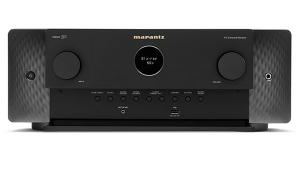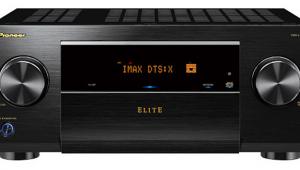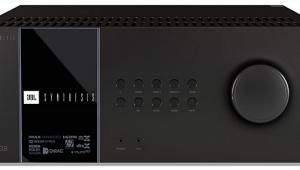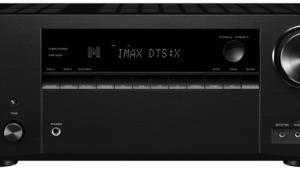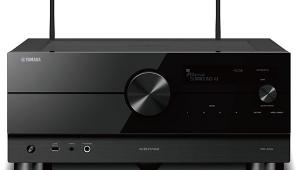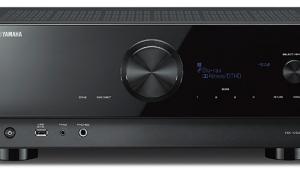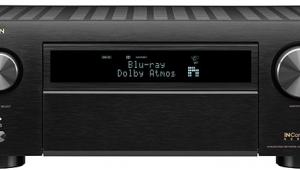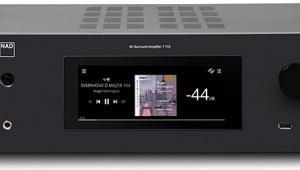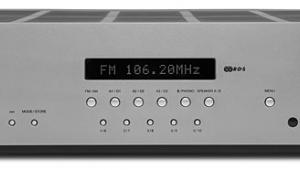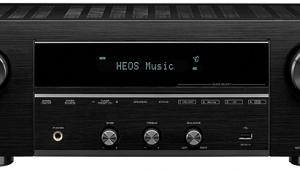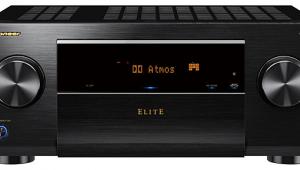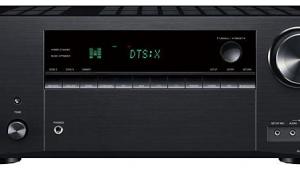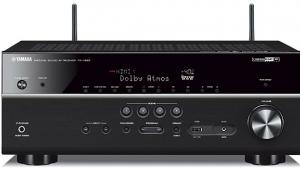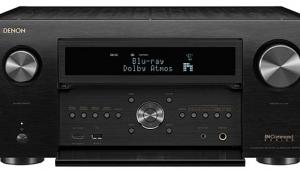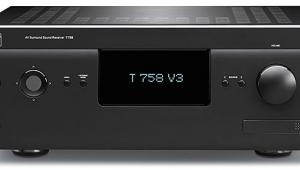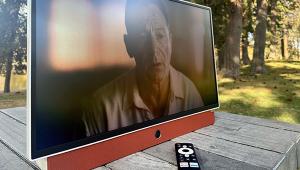Funny, I have an Onkyo TX-NR 717, which I bought in February of 2013 and which has performed flawlessly since the initial setup, and this receiver has the vtuner digital radio app instead of TuneIn, but my receiver can display the audio format and bitrate on the front of the receiver by pressing the "DISPLAY" button on the Onkyo remote and cycling through the info.
Onkyo TX-NR838 AV Receiver Test Bench
Two channels driven continuously into 8-ohm loads:
0.1% distortion at 134.9 watts
1% distortion at 173.4 watts
Five channels driven continuously into 8-ohm loads:
0.1% distortion at 110.5 watts
1% distortion at 129.3 watts
Seven channels driven continuously into 8-ohm loads:
0.1% distortion at 84.9 watts
1% distortion at 100.0 watts
Analog frequency response in Pure Audio mode:
–0.05 dB at 10 Hz
–0.02 dB at 20 Hz
+0.04 dB at 20 kHz
–2.61 dB at 50 kHz.
Analog frequency response with signal processing:
–0.09 dB at 10 Hz
–0.03 dB at 20 Hz
–0.45 dB at 20 kHz
–65.55 dB at 50 kHz.
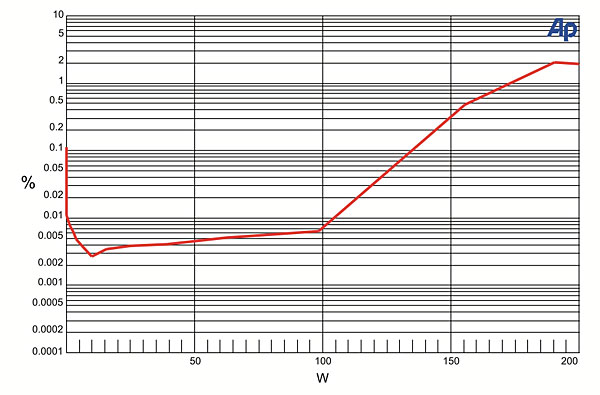
This graph shows that the TX-NR838’s left channel, from CD input to speaker output with two channels driving 8-ohm loads, reaches 0.1% distortion at 134.9 watts and 1% distortion at 173.4 watts. Into 4 ohms, the amplifier reaches 0.1% distortion at 215.3 watts and 1% distortion at 247.5 watts.
There was no multichannel input to measure. THD+N from the CD input to the speaker output was less than 0.008% at 1 kHz when driving 2.83 volts into an 8-ohm load. Crosstalk at 1 kHz driving 2.83 volts into an 8-ohm load was –88.28 dB left to right and –94.71 dB right to left. The signal-to-noise ratio with an 8-ohm load from 10 Hz to 24 kHz with “A” weighting was –109.08 dBrA.
From the Dolby Digital input to the loudspeaker output, the left channel measures –0.01 dB at 20 Hz and –0.28 dB at 20 kHz. The center channel measures –0.01 dB at 20 Hz and –0.26 dB at 20 kHz, and the left surround channel measures –0.01 dB at 20 Hz and –0.26 dB at 20 kHz. From the Dolby Digital input to the line-level output, the LFE channel is +0.07 dB at 20 Hz when referenced to the level at 40 Hz and reaches the upper 3-dB down point at 96 Hz and the upper 6-dB down point at 107 Hz.—MJP

The Onkyo passed all of our standard video tests, whether it output the source as 1080p or upconverted it to 3840 x 2160 (consumer 4K). While it did pass the MA standard-definition (480i) upconversion test, the result was smoother on motion when the Onkyo upconverted the 480i source to 1080p and let the set (a 4K Samsung here) perform the final step of the upconversion (1080p to 4K). (The rating here is based only on the upconversion to 1080p).—TJN
- Log in or register to post comments


With all of the updated equipment on these latest receivers, they do not appear to have USB 3.0. This subject seems to be pushed aside when USB is mentioned with no indication of which version it actually is! This seems like an oversight to me.

Mark, in the past year you reviewed roughly 32 products and did not give Top Picks to only 4 products. Giving 90% of your reviews a Top Pick you make the award pointless for the consumer. The only benefit is to the manufactures who often adds the badge to their website, making the product seem almost uniquely better then others. Only thing is Sound and Vision gives almost everything a Top Pick! Whats the point of a Top Pick award if 90% of products are a Top Pick? Maybe a more useful award would be Not a Top Pick. It certainly would be a rare award in Sound and Vision.

The problem is not with us having too many products on our Top Pick list, but with lazy consumers who need to be told exactly what to buy and won't read the reviews to try to discern from the comments therein the subtleties that might make one product better suited to them than another. Speakers are voiced differently and may or may not be well suited to certain types of program material or AVRs; similarly, some amps or receivers rated at X watts per channel may have petered-out sooner with our reviewer's reference speakers or didn't deliver the same soundstaging he or she is used to hearing. Should we restrict our TP list to only those five products in a category that sounded great to our reviewer in his or her room with his or her reference gear using his or her favored source material? Or should we create a recommended list of all those things that achieve a certain high standard and allow shoppers to read the reviews and make their own decisions about what to pursue? If you want our short list, we do publish our Top Pick of the Year Awards with the turning of each new calendar year--culled from all the TPs we issued throughout the prior year. For some of these products, it's only a bit of hindsight that allows us to see how very special they are.
We do periodically cull outdated products from the active TP list we keep online; mainly anything that's no longer available for purchase because it's been replaced or dropped from a manufacturers line (think TVs and AVRs). But many products -- speakers are a prime example -- are evergreen. And there are simply too many good and impressive products out there that we touch each year to say this one or even these 10 are the only ones to consider. It’s not fair to all those other great products that were on the TP list but got cut to make room even though they're still stellar, and it’s not fair to the reader, who will dismiss considering them in favor of buying S&V's flavor of the day.

How about having top picks with bronze, silver, gold and platinum status. A $399 receiver that gets a lot of things right for its price range should get a top pick with a bronze. A $20,000 pre pro that does everything right should get a top pick rating with platinum.

OK sure top pick is a good reference point for to pick up equipment that is considered to be qualified to do the job. How about another rating that would state best in class as individual price points. I know that most manufacturers don't want this type of rating since most people will only buy the what is rated as being number 1 and when people look to purchase products they look to your reviews and would only buy a receiver rated at number 1, but this would also push the manufacturers to build the best receivers that they can instead or always looking at the bottom line at cutting corners and saving money. This current rating system seems to be favoring more the manufacturer and not the consumer.

Great to see this review. I just bought this unit one week ago, and I am extremely pleased. Aside from its great audio performance and flexibility in the home theater, I think more should be said about HDCP 2.2. There are only a couple of makers out there with HDCP 2.2 in addition to HDMI 2.0 support. This will likely prove to be a VERY critical feature if you want to "future-proof" your Home Theater. With out HDCP 2.2, your receiver quite likely will not pass copy-protected 4K data. But many shoppers are only looking for HDMI 2.0 compliance, and missing an important piece of the puzzle. And HDCP 2.2 cannot be added with a firmware update.
For more info on HDCP 2.2, check this out:

There are two aspects of UHD that require future proofing when buying a current AVR, as far as I can tell. The first is HDCP 2.2 to support the new (consumer-unfriendly) copy protection scheme. The second is the ability to support high dynamic range for color depth (ala Dolby Vision). There may not be any receiver available that can satisfy both.
The Onkyo AVRs support HDCP 2.2 but apparently at the cost of not having the bandwidth to support the increased UHD color depth. All other makers have that bandwidth and can presumably be upgraded in the future to support full UHD when it's released... but don't support HDCP 2.2, which is typically a hardware specific fix and not firmware upgradeable.
So if you're choosing an AVR now, it looks like you're facing a future where you can play all UHD content but it won't look as good as it should OR can handle the best looking UHD content, but much of it might not play at all.

Inability to play with HDCP 2.2 will literally disable the passing of a signal. You would have to bypass your AVR, otherwise there will be no picture. While a lack of the high dynamic / Dolby Vision will not result in NO image going to your Ultra HD screen. So my greatest concern is that many people do not understand that a lack of HDCP 2.2 in the future could literally lock out a great deal of (copy-protected) content from ever making it through their AVR. An inability to pass Dolby Vision data will not defeat the presentation of an Ultra HD, 60 fps, stunning image from making it to your screen. And I would expect many of the people making the switch to a receiver such as this are doing so because they have ALREADY purchased an Ultra HD screen. If that is the case, it is not a Dolby Vision capable screen anyway. I am also a skeptic of Dolby Vision's future penetration. I like its potential, but it adds up to 15% more to the bandwidth of a signal, and Cable companies are already loath to reduce compression and send high-quality 1080p signals much less Ultra HD in the future. Netflix's Ultra HD House of Cards has issues IMO when I view it, and I clearly can see compression issues in the Ultra HD image. I am not going to hold my breath for them to both reduce compression AND add Dolby Vision data to the stream. But HDCP 2.2 is a simple inevitability with the studios in a futile effort to protect their content from perfect 4K piracy. I truly feel HDCP 2.2 is a "must have" if you don't want your AVR hobbled in the future. Not so with Dolby Vision.

OK video streaming usually sends the picture in 1080P or 4K but yes it is some what compressed, there is not enough bandwith to cover everything. Also no one mentions that they do not send the audio over in Dolby True HD and DTS-HD Master Audio never mind Dolby Digital Atmos, also audio is not sent over in 7.1 chanels as well.

I purchased the Onkyo TX-NR838 based on the review. Let me tell you... I am severely disappointed with this reciever. I have a TX-NR807 and this one completely blows away the 838 in its ability to make good sound! The 838 lacks adjustibiliity to make good sound and the amplifier distorts quite easily. The 838 will be quickly gone very quickly, as the 838 lacks any ability to be considered by anyone who desires a good A/V reciever.
Thank heavens, I was only looking to replace the 807 with the 838 as a back-up reciever and was not looking for this to be my main reciever(I use separates for my system).
S&V should be embarrassed to have considered the 838 as a "tip pick. The 838 does not even compare with the 807, let alone separates you are able to purchase at a reasonable price!! *Cough* Emotive xXPA-7 and UMC-200 *Cough* and *WINK*
The Onkyo TX-NR838 should not be purchased. I have quite few of Onkyo's A/V receivers and the 838 is a big dud!!

The XPA-7 is a 7 channel amp that costs more the msrp price of the receiver and the UMC-200 is a stereo amp. So not sure why you even mention them at this price point.

Looking at the Onkyo TX-NR838 Advanced User Manual, on page 64 under "About Copyright Protection" it states:
This unit supports Revision 1.4 and Revision 2.2 (HDMI OUT MAIN and HDMI IN3 only) of the HDCP (High Bandwidth Content Protection).
The review appears to indicate that this is available across all HDMI inputs and outputs.
